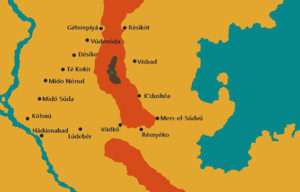Nárhitihnism
Nárhitihnism is the official religion of Palesmenia. The current Vínot is Dúsno IV, who currently resides in Ábbad.
Story of Nárhit
Background
The religion was conceived at a time where the Palesh people still lived in the East Keltian Steppe, thus the locations in the story are located there.
Before Nárhit's Travels
The king of the gods, Ánu, received a prophecy that, before long, a single man would overtake his popularity. Angered, he sent upon a famine that would decimate the steppe cities and nearly destroying the Palesmenian way of life. This lead to many people abandoning their artisan way of life and becoming traders, wandering the steppes in the hopes of scavenging food for their families.
The Story, In Short
Nárhit, a steppe trader looking for food, was contacted by an old man in the inner quarters of the city of Vísbad, who told the young trader of a Héhod, a small sun made out of many pieces located in several cities throughout the steppe in return for the location of a secret grain warehouse. Nárhit decides to go on this quest and goes to many cities and gets the peaces, except for at the city of RésiKót. When he reports back to the old man that he could not find the last piece, the man kills Nárhit. It is then revealed that the old man had the last peace, and wanted to get the rest of the pieces from the young trader This lead to many people treating this man as a martyr in the struggle for survival. His popularity caused many people to abandon the way of Ánu,
Books
Pérkihatas
The chapters of the Vyúda Nárhiti are known as books. Each detail Nárhit's journeys in each city. Here is a summary of what he did in each city to find each piece, in order:
- Vísbad- Where Nárhit gets his quest
- K'dushéa- Where he had to clean the sewers
- Mers-el-Súdvú- Where he had to sift through bags of rice
- Résnyéko- Where he had to set a Food Hoarder's house on fire
- Vüdko- Where he had to descend into an underground tomb
- Lúdebér- Where he had to search in salt flats
- Hadúsnahad- Where he had to sift the dirts of the Strait of Haifa
- Kólsnú- Where had to climb into the mayor's house.
- Midó Súda- Where had to sneak into the brewery's basement.
- Midó Nórud- Where he had to dig up a shady looking grave
- Té Kokir- Where he had to pickpocket the local policeman
- Desíke- Where he had to steal it from next to a military entrenchment
- Vúdenóda- Where he had to buy it from a local grocer
- Géfeinpíyá- Where he had to plea to the local raiders to take it from the fort
- RésiKót- Where he can't find it
- Ésirectá- Death and Peace
Yékerhatas
- Pásaké: On the principles of humanity
- Sérhita: On being a good person
- Ésavánicsélem: On the threat of the Vanic way of life and how to best contain it
- Chégorána: On how changing allegiances can fill a person with sin
Prophets
There are many canon prophets of Nárhit. It is disputed if any of these people were real, but religious scholars accept them as real. Dates are given in the traditional religious dating system.
- Eúsmosá: 27 pNDS-43 NDS
- Oílege: 33 pNDS-24 NDS
- Zárathúntré: 25 pNDS- 50 NDS
- Uídemuná: 19 pNDS- 30 NDS

